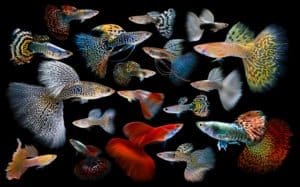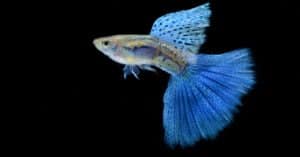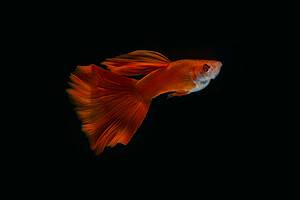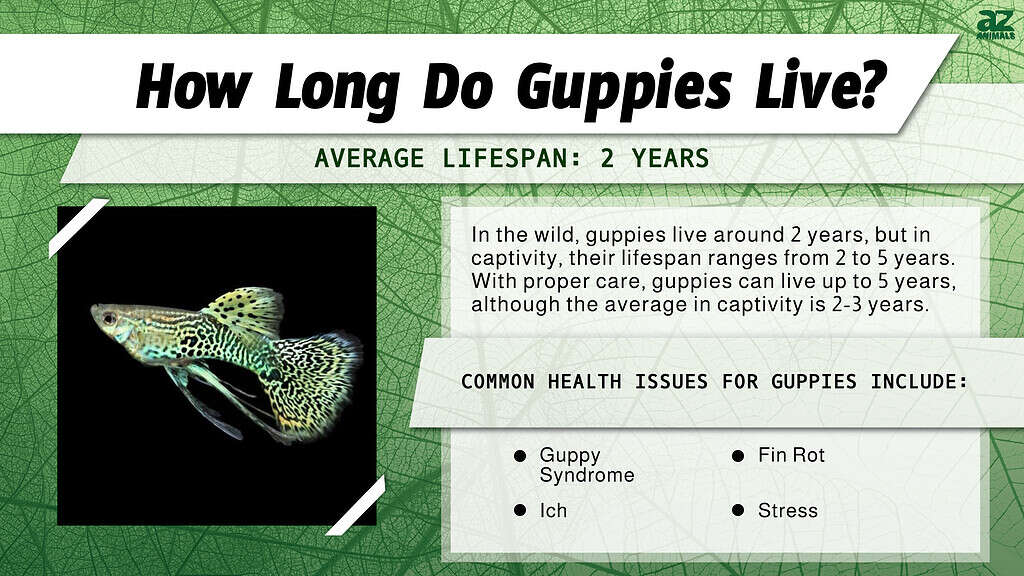
Have you been looking for a new pet that is easy to care for and yet incredibly beautiful to look at? Look no further than the guppy. Guppies make fantastic pets and are good additions to the aquariums of both seasoned fish owners and novices. Guppies are a kind of tropical freshwater fish native to South America. There are almost 300 distinct varieties of guppy in the Amazon rivers, as well as in Barbados, Brazil, Guyana, Trinidad & Tobago, and Venezuela.
Guppies come in a variety of colors and fin forms. It’s no coincidence that the guppy fish is also known as rainbow fish. Let’s learn all about the guppy and everything a new owner would need to know! This includes how long guppies live and how you keep your guppy healthy for many years.
How Long Do Guppies Live?
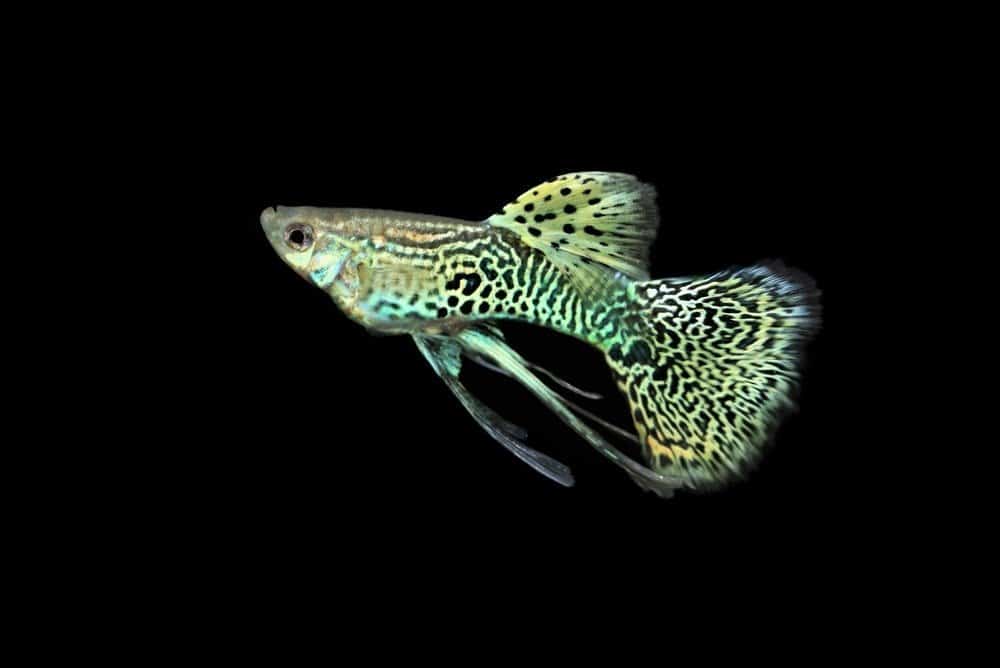
Guppies live an average of 2 to 3 years.
©Arunee Rodloy/Shutterstock.com
In the wild, guppies live an average of 2 years. However, in captivity guppies can live anywhere between 2-5 years. Although the average is typically 2-3 years in captivity, if properly cared for, guppies have been known to live up to 5 years.
Research done on the lifespan of guppies has found some interesting revelations with regards to aging amongst predators. Most biologists studying aging assume that decreasing external deaths from predation will lead to a longer lifespan. However, surprisingly enough, guppies exposed to predation appear to live longer (and age slower) than comparable fish from a similar habitat without predators. It has also been discovered that guppies also have post-reproductive lives as well, similar to many mammals.
The Average Guppy Life Cycle
Now that we have a better understanding of how long guppies live, let’s learn all about their reproductive cycle. Guppies have a very straightforward life cycle. They are livebearers that do not produce eggs, hence the larval stage is totally absent.
Fry Guppy
Guppy fry are free to swim from the outset. The first thing they do after birth is look for a place to hide. They are misshapen at first, but after a few hours, their bodies straighten and grow strong enough to begin eating. Guppy fry are tiny, measuring around 1/4 inch in length.
Juvenile Guppy
Guppy fry reach the juvenile stage after roughly a month. They begin to gain color in the juvenile stage, and the sexes may be distinguished. They start maturing sexually around 2 months.
The juvenile period is one of the most crucial in a guppy’s existence. It is critical to provide them with the best food and water possible during this time.
Young Guppy
Young guppies become sexually active around two months. During this stage, if they are being kept in captivity, breeders will separate the males from the females. This allows for the guppies to develop. It’s important to feed young guppies differently than the fry. It’s also important to reduce their fat consumption while increasing their protein and vegetable intake.
Adult Guppy
Guppies reach adulthood at roughly 6 months of age. A mature female guppy can grow to be 1.5-2 inches long depending on genetics and environmental factors. Their development will come to a halt or severely slow down at this stage.
What Are The Most Common Causes of Death for Guppies?
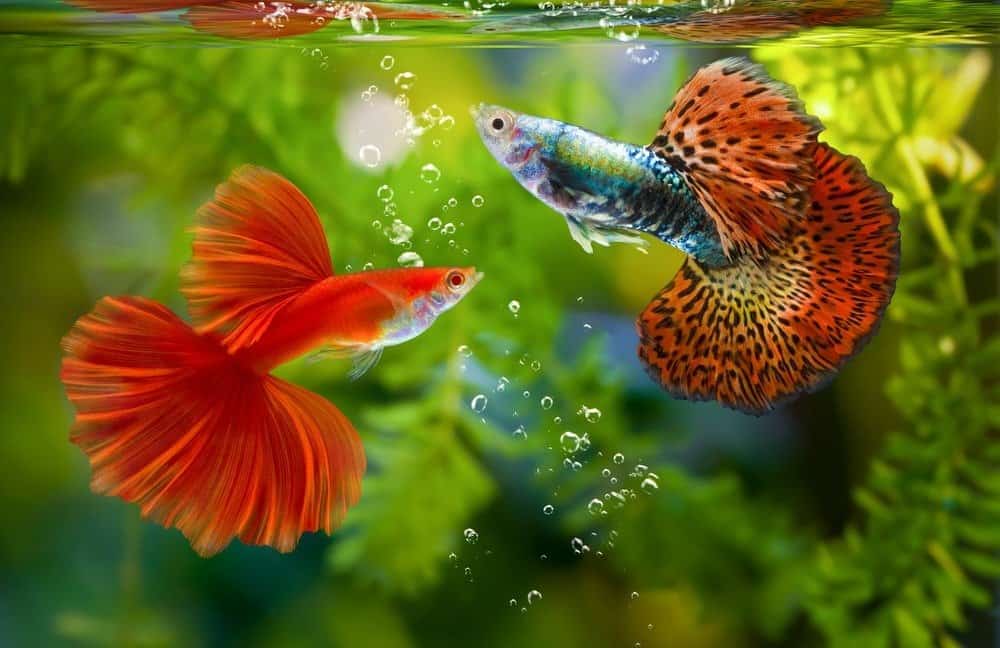
The most common cause of guppy death is poor water quality.
©panpilai paipa/Shutterstock.com
Since guppies are at the bottom of the food chain, it’s only expected that they have numerous predators in the wild and in the tank. Because guppies have smaller bodies and brighter colors, they are easy prey for predators.
Some of the most common predators that guppies in their native range have to watch out for include:
- Cichlids
- Jumping guabine
- Blue acara
- Tigerfish
- Fat sleepers
- Rivulus
- Golden trahiras
When living in a tank, guppies must watch out for larger fish such as:
Outside of predation, there are other factors that can contribute to a guppy fish dying prematurely. Poor water quality is the most prevalent cause of guppies dying in aquariums. Guppies excrete waste which pollutes the water. Over time, the pollution levels might get so high that the guppies become sick and die.
Overfeeding guppies is another major issue as well. Overfeeding eventually results in uneaten meals. Uneaten food can contaminate your aquarium and can be a significant cause of ammonia buildup. Ammonia is extremely damaging to your fish. A high ammonia level typically results in the death of the fish.
How To Extend The Life Of Your Pet Guppy
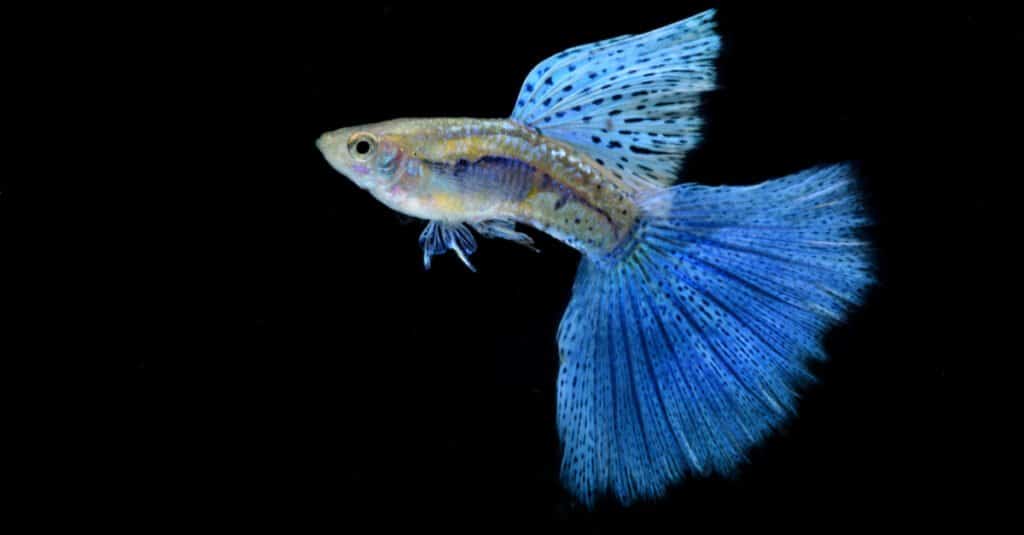
©Nantawat Chotsuwan/Shutterstock.com
Now that we have a better idea of how long guppies live and what can disrupt their lifespan, it’s time to learn how we can extend their life. Keeping guppies alive involves taking the best care of them.
Here are the most important tips and tricks for keeping them alive for longer:
- Feed them a well-balanced diet: Guppies are omnivores, which means they eat both animal and plant foods. As a result, you should offer them high-quality meals to ensure their healthy growth. You should also give them live food on a regular basis, such as brine shrimp, daphnia, and bloodworms. Guppies can eat plant-based meals as well. You may also give them veggies on a regular basis.
- Choosing a proper tank: Choosing the appropriate fish tank size is critical for keeping your guppies happy and healthy. It will be much more difficult to maintain ideal water quality if you buy a very tiny fish tank. When it comes to tank size for guppies, a decent rule of thumb to follow is 1 gallon per inch of guppy fish.
- Maintain the water quality: Ammonia should not be present in your guppy fish aquarium. Even low levels of ammonia can spell death for your fish. Because guppies are tropical fish, they require warmer water. Guppies prefer temperatures ranging from 72° F to 78° F.
The photo featured at the top of this post is © Nantawat Chotsuwan/Shutterstock.com
Thank you for reading! Have some feedback for us? Contact the AZ Animals editorial team.



